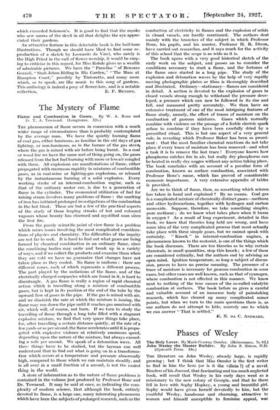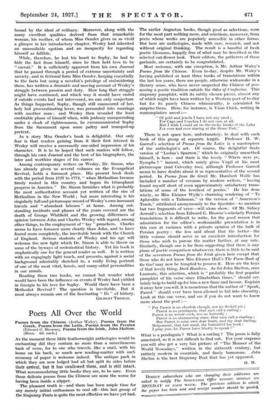Phases of Wesley
Tax literature on John. Wesley, already large, is rapidly growing ; but I think that Miss Oemler is the first writer to find in him the hero (or is it the villain ?) of a novel, Readers of his Journal, that fascinating and too much neglected book, will recall that Wesley in his early days. went as a missionary to the new colony of Georgia, and that he there fell in love with Sophy Hopkey,. a young and beautiful girl. Sophy would have given herself devotedly to him, but the youthful Wesley, .handsome and charming, attractive to women and himself susceptible to feminine appeal, was
bound by the ideal of celibacy. Moreover, along with the many excellent qualities derived from that remarkable woman, his mother, of whom Miss Oemler gives us so vivid a glimpse in her introductory chapter, Wesley had inherited an unassailable egotism and an incapacity for regarding himself as fallible.
While, therefore, he lost his heart to Sophy, he had to hide the fact from himself, since he then held love to be " carnal." It is sufficiently apparent from his own Journal that he passed through a period of extreme uncertainty and anxiety, and in fictional form Miss Oemler, keeping essentially to the facts but using a novelist's privilege of embroidering them, has written a dramatic and moving account of Wesley's struggle between passion and duty. How long that struggle might have continued, and which way it would have ended if outside events had not intervened, we can only conjecture As things happened, Sophy, though still enamoured of her. holy but procrastinating lover, was persuaded into marriage with another man ; and Wesley then revealed the least creditable phase of himself when, with jealousy masquerading under a cloak of righteousness, he excommunicated Sophy from the Sacrament upon some paltry and trumped-up pretext.
As a story Miss Oemler's book is delightful. Our only fear is that readers gaining from it their first interest in Wesley will receive a necessarily one-sided impression of his character. It is to be hoped that such readers will follow, through his own Journal and the best of his biographers, the later and worthier stages of his career.
Among contemporary writers on Wesley, Dr. Simon, who has already given us several volumes on the Evangelical Revival, holds a foremost place. His present book deals with the period from 1757 to 1772, " when Methodism became firmly rooted in this country and began its triumphant progress in America." Dr. Simon furnishes what is probably the most authoritative account yet written of the rise of Methodism in the New World ; but more interesting is his singularly full and picturesque record of Wesley's own incessant travels and " abundant labours " at home. Among out- standing incidents and phases of the years covered are the death of George Whitfield and the growing differences of opinion between John and Charles Wesley with regard, among other things, to the employment of " lay " preachers. Charles seems to have foreseen more clearly than John, and to have feared more completely, the inevitable break with the Church of England. Serious students of Wesley and his age will welcome the new light which Dr. Simon is able to throw on some of the byways of ecclesiastical history. Yet his book is emphatically one for the general reader as well. It is written with an engagingly light touch, and presents, against a social background admirably sketched in, a really living portrait of one of the most vital, heroic, and many-sided personalities in our annals.
Reading these two books, we cannot but wonder what would have been the influence on events if Wesley had yielded in Georgia to his love for Sophy. Would there have been a Methodist Revival ? The question is inevitable. But it must always remain one of the fascinating " Ifs " of history.
GILBERT THOMAS.











































 Previous page
Previous page